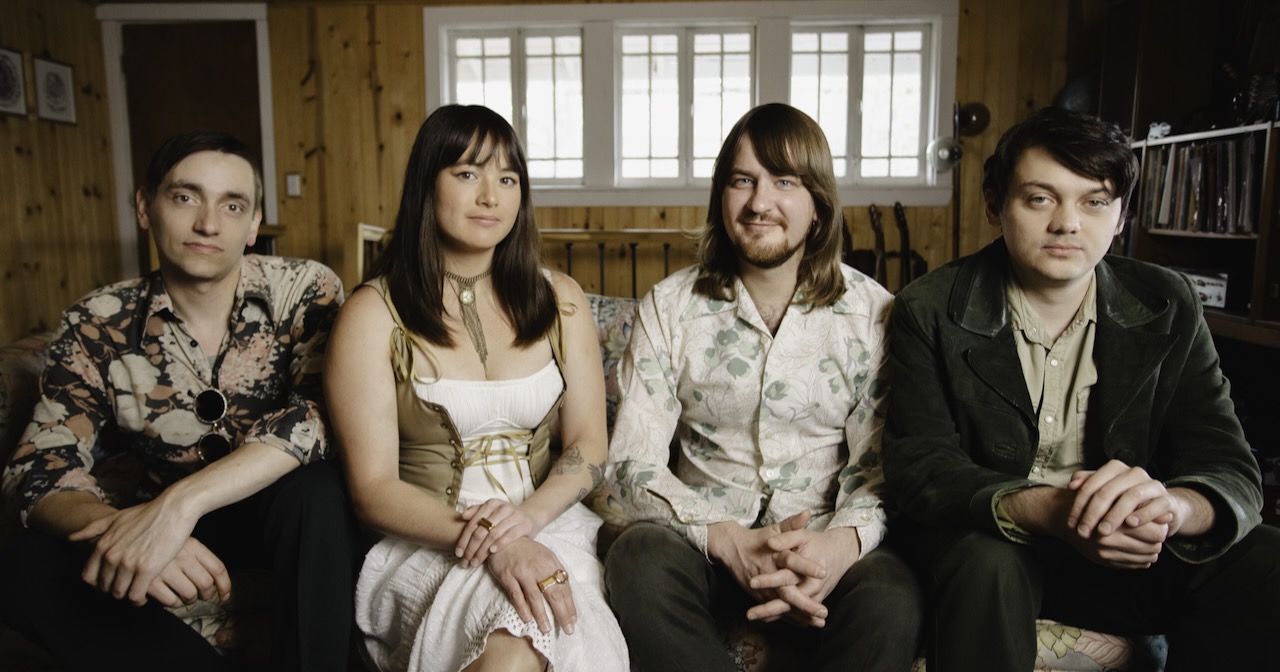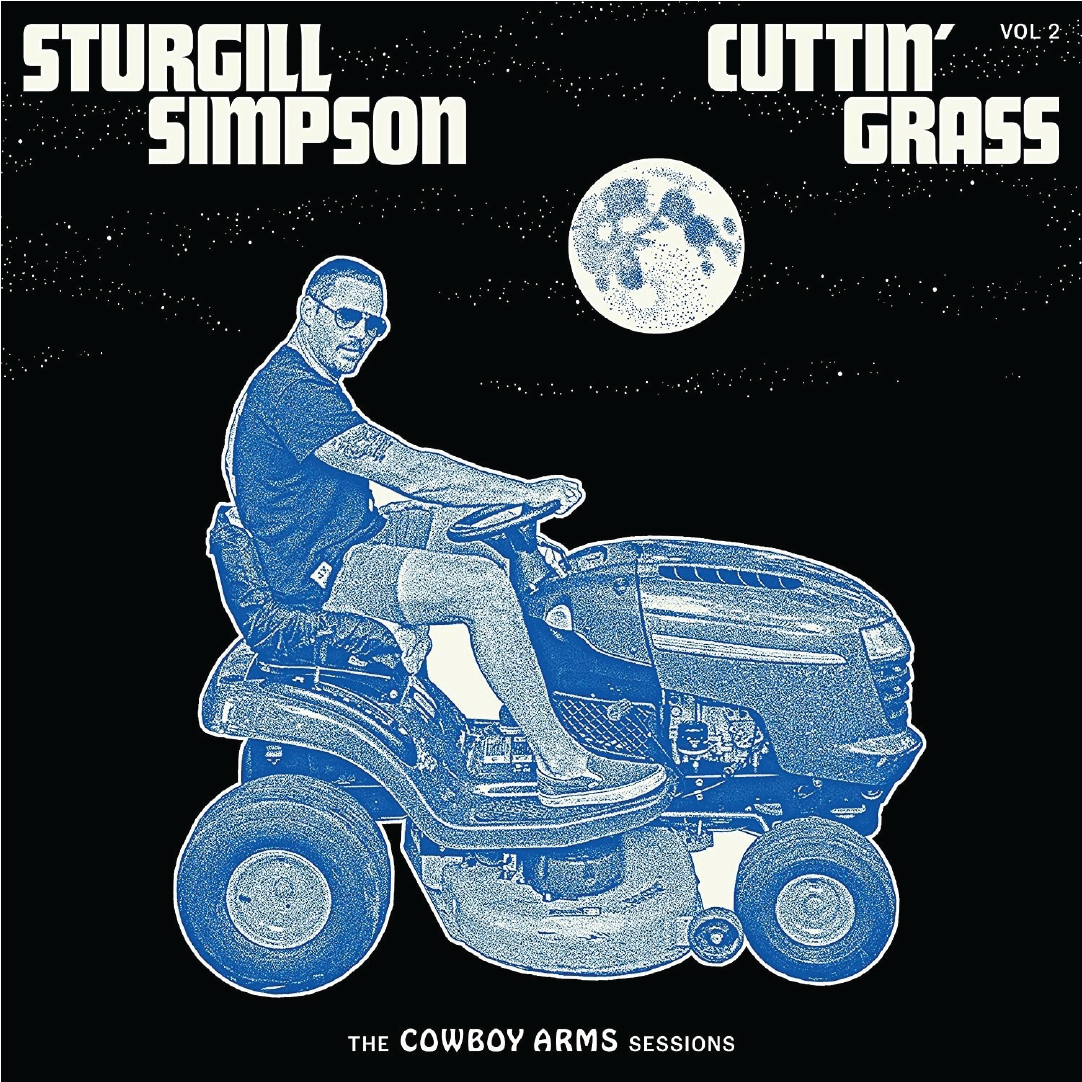At 26, the prodigy phase of AJ Lee’s music career has passed. It might take a little more time for the tendency to confuse her with a professional wrestler using the same name to fade away.
“I think I could take her!” Lee — the singing one — gamely pronounces at the conclusion of an interview on the third album by AJ Lee & Blue Summit, City of Glass (out July 19 on Signature Sounds), prompting laughter from the band’s Scott Gates, who asserts himself on the new album writing three songs on which he sings lead.
Rounding out Santa Cruz, California-based Blue Summit are fiddler Jan Purat and guitarist Sullivan Tuttle, one of the children of educator-musician Jack Tuttle and brother of breakout star Molly Tuttle. Lee also got her start with “The Tuttles with AJ Lee.”
A keen sense of humor dots City of Glass, which was produced by Lech Wierzynski of “retro-soul” band The California Honeydrops. It was Wierzynski who suggested Harlan Howard’s “He Called Me Baby,” on which Lee delivers a notably sultry lead vocal. The reference point for her version of “He Called Me Baby” is soul singer Candi Stanton, rather than Patsy Cline or Charlie Rich.
“I was raised to sing pretty straightforward. I wanted to remove as much ego as I could, because I just wanted to sing and have fun,” Lee said. “I’ve learned to put a little bit more of my personality into it and that, I think, is making me a better singer overall, which is why we wanted to work with Lech in the first place, because he’s such a powerful singer.
“That really resonated with me and I’m trying to move more in that direction.”
Gates pipes up at this point: “AJ’s not going to say this, but Lech brought ‘He Called Me Baby’ to the table because he had the foresight, coming from that soul world, he recognizes in AJ’s voice the ability to do this kind of thing.
“The cross-pollination of these American roots, is a smart move from Lech, I think,” he said.
BGS caught up with Lee and Gates as they rehearsed in Nashville, Tennessee, and prepared to do some lip synching for a video. As a seasoned bandleader, Lee takes pains to spread the credit for her success around and steers some questions toward Gates to try and ensure she doesn’t dominate the conversation.
City of Glass is AJ Lee & Blue Summit’s third album. How do you view the progression that got you to this point?
AJ Lee: The first album, [Like I Used To], we were looking for what kind of sound we wanted as a band. Because at that time, it was only four members without a fiddle player. So on that one, we had some more electric instruments and more drums. The second album, [I’ll Come Back], we went more acoustic roots, because we just wanted to play more bluegrass, because that’s what we grew up on and that’s what we do best. For this third album, we’re confident doing bluegrass, roots, and country, sticking with more stringed instruments, but also branching out. With Lech’s involvement, we’re leaning a little bit towards soul, R&B, and keeping it interesting, but still showcasing ourselves and what we like to play and what we like to do.
Several songs on City of Glass are funny. There’s one, “Toys,” making fun of a men who act like boys, another about getting “Sick on a Plane” and a humorous take on busking, “Solicitor Man.” Why so lighthearted this time around?
Scott Gates: I grew up playing bluegrass with a lot of silly guys. There’s a bouncy kind of lighthearted feel in a lot of traditional stuff. … I noticed that a lot of songs that I had written were kind of getting down into my feelings and whatnot, and I wanted to write one that I knew would be fun for my friends to play.
Are there models in bluegrass you’re following with the humor?
SG: There is a history of fun stuff like The Louvin Brothers. I’m also influenced by Jimmy Martin. Jimmy Martin is one of the pillars of bluegrass music, and he’s hilarious.
“Toys” is about a young guy or maybe an immature man. Is it about yourself, Scott?
SG: A little bit, yeah, probably as a teenager noticing the involuntary methods by which young, dumb boys go about thinking of themselves. It was mostly born out of that phrase, “The man who dies with the most toys wins.”
The title cut, “City of Glass,” is about leaving an artistic legacy. Aren’t you guys a little young to be concerned about that?
AJ: Yeah, I’m pretty young. I’m 26 now, but I have been doing music since I was really young. Collectively, we figured out that the band has about 90 years worth of experience. I’ve been playing on stage since I was about four or five years old. So I’m young, but I have been doing it for a long time. Legacy is having something that you’ve made be around even when you’re not doing it anymore. That’s a big theme of “City of Glass.”
As you say, you got started very young as musicians and Jack Tuttle was a common mentor. How did that develop?
SG: I met AJ when she was four. I knew her older sister Molly, ‘cause she’s my age. So I knew her more. But [Sullivan Tuttle] was around, and Sully and AJ had known each other since back then. I was probably about seven or eight when I first started going to the Father’s Day Festival and the music camp. So I got an opportunity to learn and play from people like John Reischman and Mike Compton and see musicians like The Osborne Brothers and Earl Scruggs. The picking scene is incredibly high quality.
AJ, you were the only non-Tuttle in the Tuttle family band when you were very young. What was that like?
AJ: I loved it. As a young kid, it’s kind of hard to be in the moment and really appreciate what you’re doing. As a seven-year-old to fifteen-year-old, I went about it as like, “OK, we’re playing a gig, I’m going to practice here and I’m going to sing my song. I’m hanging out with my friends, and that’s it.” But being in that band was definitely instrumental in my progress as a bluegrass musician, because I got to work directly with Jack Tuttle. Everyone loves Jack because he’s such a renowned teacher in the community and obviously all of his kids are talented beyond measure. So I was able to play with people who were better than me and also equal to me. My mom, growing up, she always said, “You always want to play with people who are better than you, because that’s how you’re going to get better.” And so I got to have that opportunity for many years.
Is there any competition now between yourself, Molly Tuttle and Bronwyn Keith-Hynes now that you all are competing musicians in the marketplace?
SG: Absolutely! [Laughs]
AJ: No, no, no, definitely not. For me and Molly, we’re branching off and doing our own thing. We were in a band for however many years, and now we’re off doing our own projects. And Bronwyn is branching off and doing her own projects in a similar way.
So, it’s the same in any community or genre of music, you played together and now you’re doing your own thing. Molly’s singing on our album as well, on a song [“I Can’t Find You at All”] that her dad wrote.
AJ, you could pursue a solo career, why do you prefer a band situation?
AJ: It makes me happy. I like playing with other people. I don’t really like performing by myself. I feel like I have a lot to offer, but I also like playing with people who also have a lot to offer and are amazing talents. And, you know, people compliment our band on how many singers there are. I always think that the more singers the better, the more talent you can showcase the better.
Pretty much anyone in the band could peel off and do a solo career. But I think what makes us really unique and strong as a band is that we all can be individual musicians, but we choose to play together, because it just makes the creative juices flow more and it makes us want to even continue on more than I would as a solo musician.
SG: At some point, I’ll probably do my own project. But right now, all I care about is playing music with AJ and the boys and see where this goes. I try not to plan too much. I don’t really scheme. I probably should scheme a little bit more, but I just don’t.
How does the California bluegrass scene differ from the South?
SG: A lot of people think of California as the jammy stuff, the Deadhead stuff that comes out of there. But even to this day, the California Bluegrass Association is very traditional. It’s one of the most traditional associations out there and there’s also a huge focus on singing. The singers that come out of a place like Tennessee are extremely good at blending. There’s a school of singing, and a lot of them sound very similar. Their harmonies are incredibly perfect. But California tends to reward individuality and uniqueness. The unique voices are kind of put on a pedestal.
AJ, your singing style is more subtle than showy. Why?
AJ: I agree with you. I’ve always really appreciated the subtlety of singing to where it’s not, “Look at me. Look at how well I can sing.”
“Hillside” uses the metaphor of a hill that aspires to be a mountain. What does the metaphor represent?
AJ: “Hillside” is about women empowerment. The metaphor is that you are this hill that is bombarded by all these outside elements trying to knock you down. But your foundation has become so strong and nothing’s really going to topple you over.
Have you experienced a lot of sexism in your career?
AJ: I’ve experienced some, of course. Especially after shows, you know a lot of older gentleman say things to me that obviously they mean well, but it just turns out to be very sexist. I get a lot of the, “If I was 20-years, 30-years younger” sort of statements, and it’s just like, “Ooh, gosh.”
How about general discrimination?
AJ: Yeah, especially jamming in the bluegrass community, as a woman sometimes you’ll just get into those circles that have that male energy so present and it’s really hard for women to join a jam sometimes. But I’ve learned to try to just get myself in there over the years with support from my mom and other strong women who are also in the community.
Are you on the record on where the “Blue Summit” band name originates?
AJ: Our first festival we played was a Kate Wolf festival. We actually didn’t really have a band name yet that we were happy with. The original name we hated. Our original bass player at the time, Isaac Cornelius, came up with The Highway 17 Savages, which doesn’t really resonate with our band at all. We totally needed to change this name. So we made these recordings to send in to Kate Wolf at Isaac’s house, which he grew up on the summit in Santa Cruz. So we were like bluegrass on the summit. So we became Blue Summit.
Photo Credit: Natia Cinco






